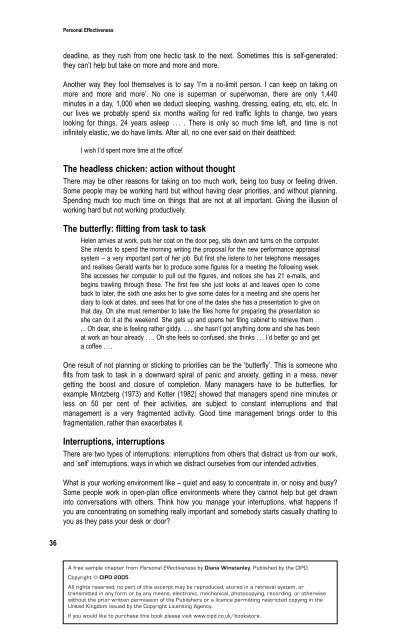Download - CIPD
Download - CIPD
Download - CIPD
You also want an ePaper? Increase the reach of your titles
YUMPU automatically turns print PDFs into web optimized ePapers that Google loves.
Personal Effectivenessdeadline, as they rush from one hectic task to the next. Sometimes this is self-generated:they can’t help but take on more and more and more.Another way they fool themselves is to say ‘I’m a no-limit person. I can keep on taking onmore and more and more’. No one is superman or superwoman, there are only 1,440minutes in a day, 1,000 when we deduct sleeping, washing, dressing, eating, etc, etc, etc. Inour lives we probably spend six months waiting for red traffic lights to change, two yearslooking for things, 24 years asleep . . . . There is only so much time left, and time is notinfinitely elastic, we do have limits. After all, no one ever said on their deathbed:I wish I’d spent more time at the office!The headless chicken: action without thoughtThere may be other reasons for taking on too much work, being too busy or feeling driven.Some people may be working hard but without having clear priorities, and without planning.Spending much too much time on things that are not at all important. Giving the illusion ofworking hard but not working productively.The butterfly: flitting from task to taskHelen arrives at work, puts her coat on the door peg, sits down and turns on the computer.She intends to spend the morning writing the proposal for the new performance appraisalsystem – a very important part of her job. But first she listens to her telephone messagesand realises Gerald wants her to produce some figures for a meeting the following week.She accesses her computer to pull out the figures, and notices she has 21 e-mails, andbegins trawling through these. The first few she just looks at and leaves open to comeback to later, the sixth one asks her to give some dates for a meeting and she opens herdiary to look at dates, and sees that for one of the dates she has a presentation to give onthat day. Oh she must remember to take the files home for preparing the presentation soshe can do it at the weekend. She gets up and opens her filing cabinet to retrieve them . .... Oh dear, she is feeling rather giddy, .. . . she hasn’t got anything done and she has beenat work an hour already . . .. Oh she feels so confused, she thinks . . . I’d better go and geta coffee . . ..One result of not planning or sticking to priorities can be the ‘butterfly’. This is someone whoflits from task to task in a downward spiral of panic and anxiety, getting in a mess, nevergetting the boost and closure of completion. Many managers have to be butterflies, forexample Mintzberg (1973) and Kotter (1982) showed that managers spend nine minutes orless on 50 per cent of their activities, are subject to constant interruptions and thatmanagement is a very fragmented activity. Good time management brings order to thisfragmentation, rather than exacerbates it.Interruptions, interruptionsThere are two types of interruptions: interruptions from others that distract us from our work,and ‘self’ interruptions, ways in which we distract ourselves from our intended activities.What is your working environment like – quiet and easy to concentrate in, or noisy and busy?Some people work in open-plan office environments where they cannot help but get drawninto conversations with others. Think how you manage your interruptions, what happens ifyou are concentrating on something really important and somebody starts casually chatting toyou as they pass your desk or door?36A free sample chapter from Personal Effectiveness by Diana Winstanley. Published by the <strong>CIPD</strong>.Copyright © <strong>CIPD</strong> 2005All rights reserved; no part of this excerpt may be reproduced, stored in a retrieval system, ortransmitted in any form or by any means, electronic, mechanical, photocopying, recording, or otherwisewithout the prior written permission of the Publishers or a licence permitting restricted copying in theUnited Kingdom issued by the Copyright Licensing Agency.If you would like to purchase this book please visit www.cipd.co.uk/bookstore.

















